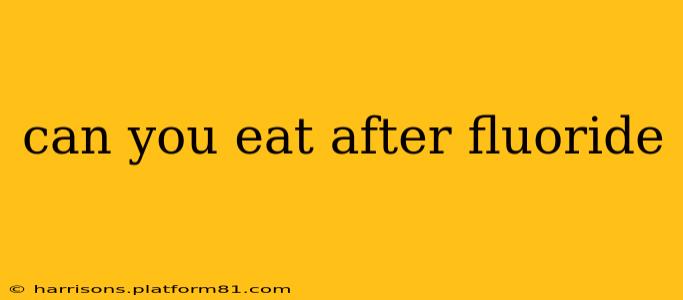Many people wonder about the best practices following a fluoride treatment, especially regarding food and drink. The short answer is yes, you can eat after a fluoride treatment, but it's crucial to understand when and what you consume to maximize the treatment's effectiveness and avoid potential discomfort. This guide will explore the nuances of post-fluoride treatment dietary considerations.
What Happens During a Fluoride Treatment?
Before delving into post-treatment dietary recommendations, let's briefly understand the procedure. Fluoride treatments, commonly applied by dentists, involve the application of a fluoride varnish, gel, or foam to strengthen tooth enamel and prevent cavities. The active ingredient, fluoride, works by integrating into the tooth's structure, making it more resistant to acid attacks from bacteria and sugars.
How Long Should You Wait Before Eating After a Fluoride Treatment?
This is a key question, and the answer depends on the type of fluoride treatment received. Generally, dentists recommend waiting for at least 30 minutes after a fluoride treatment before eating or drinking anything. Some dentists may advise waiting up to an hour or longer, particularly after a varnish application. This waiting period allows the fluoride to properly adhere to and penetrate the tooth enamel.
Consuming food or drinks too soon can wash away the fluoride before it has a chance to work its magic, potentially reducing the treatment's effectiveness. The longer you wait, the more effectively the fluoride can integrate into your teeth.
What Should You Avoid Eating After a Fluoride Treatment?
While you can eat after the recommended waiting period, it's best to avoid certain foods and drinks in the hours immediately following your treatment. These include:
- Highly acidic foods and drinks: Acidic substances, such as citrus fruits (oranges, lemons, etc.), tomatoes, soda, and even some juices, can neutralize the fluoride and potentially irritate your teeth.
- Sticky or sugary foods: These can adhere to the fluoride and interfere with its absorption, while the sugars themselves feed the bacteria that cause cavities. Candy, sticky pastries, and honey should be avoided.
- Hot foods and drinks: These can cause discomfort or even sensitivity, especially if your teeth already felt sensitive before the treatment.
Can You Brush Your Teeth After a Fluoride Treatment?
Many people also wonder about brushing their teeth. Generally, it's recommended to avoid brushing your teeth for at least 30 minutes to several hours after a fluoride treatment. Brushing too soon can dislodge the fluoride before it has fully bonded with your enamel. Your dentist will provide specific instructions based on the type of fluoride treatment you received.
What Can You Eat After a Fluoride Treatment?
After the waiting period, you can resume your normal diet. However, prioritizing nutritious, fluoride-friendly choices will further support your oral health. This could include foods rich in calcium and phosphorus to promote strong teeth and gums.
Are There Any Side Effects of Fluoride Treatment?
Most people experience no side effects. However, some might experience temporary mild tooth sensitivity or a slight tingling sensation. These usually subside quickly. If you have persistent or severe discomfort, contact your dentist.
Frequently Asked Questions (FAQ)
This section addresses common questions surrounding fluoride treatments and post-treatment dietary considerations.
What if I accidentally eat or drink something right after my fluoride treatment?
While not ideal, a single instance of accidental ingestion likely won't significantly affect the treatment's efficacy. However, try to adhere to the dentist's recommendations as closely as possible for optimal results.
How long does the fluoride treatment last?
The duration depends on the type of treatment and individual oral hygiene practices. The effects of fluoride treatments typically last for several months.
How often should I get a fluoride treatment?
The frequency of fluoride treatments varies based on individual needs and risk factors. Your dentist will recommend a schedule tailored to your specific situation.
This comprehensive guide provides a clearer understanding of post-fluoride treatment dietary considerations, empowering you to make informed choices for optimal oral health. Remember to always follow your dentist's specific instructions for the best results.
